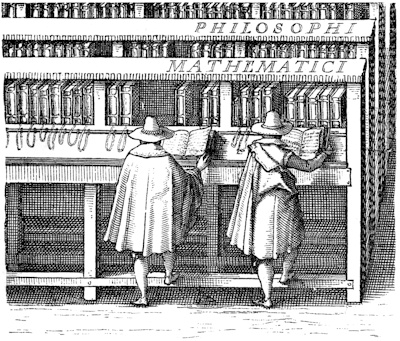Medieval Libraries and ManuscriptsLibrary of Christ's Hospital: from Trollope's "History of Christ's Hospital," p. 105. This view is an excellent illustration of the point on which I have insisted, namely, that in the course of the fifteenth century the great religious Houses—no matter to what Order they belonged—found that their books had become too numerous for the localities primitively intended for them, and began to build special libraries—usually over some existing structure; or—in other words—established a library of reference, which was not unfrequently thrown open to scholars in general, who were allowed to borrow books from it, on execution of an[Pg 32] indenture, or deposit of a sufficient pledge. "It is safer to fall back on a pledge, than to proceed against an individual," said the Customs of the Priory at Abingdon. ANALOGY BETWEEN
In what way were these monastic libraries fitted up? No trace of any monastic fittings has survived, so far as I am aware, either in England, or in France, or in Italy; and even M. Viollet-Le-Duc dismisses "The Library" in a few brief sentences, of which the keynote is despair. My own view is that a close analogy may be traced between the fittings of monastic libraries and those of collegiate libraries; and that when we understand the one we shall understand the other. MONASTERIES AND COLLEGES.
The collegiate system was in no sense of the word monastic, indeed it was to a certain extent established to counteract monastic influence; but it is absurd to suppose that the younger communities would borrow nothing from the elder—especially when we reflect that the monastic system had completed at least[Pg 33] seven centuries of successful existence before Walter de Merton was moved to found a college; that many of the subsequent founders of colleges were churchmen, if not actually monks; and that there were monastic colleges at both Universities. Further, as we have seen that study was specially enjoined upon the monks by S. Benedict, it is precisely in the direction of study that we should expect to find common features in the two sets of communities. And this, in fact, is what came to pass. An examination of the statutes affecting the library in the codes imposed upon the colleges of Oxford and Cambridge shews that their provisions were borrowed directly from the monastic Customs. The resemblances are too striking to be accidental. Take, for instance, this clause, from the statutes of Oriel College, Oxford, dated 1329: Next: Sidenotes 4
| |





